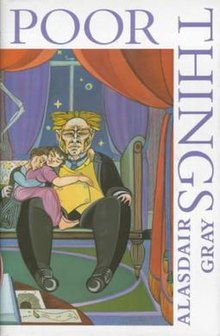 Title: Poor Things
Title: Poor Things
Author: Alasdair Gray
Date of First Publication: 1992
Place of Publication: Bloomsbury
Type: Novel
Characters: No Character
Themes: ANDROID; BYRONIC HERO; RETRO SF; SYMPATHETIC MONSTER; QUEER FRANKENSTEIN
Critical Summary: Alasdair Gray’s novel, Poor Things, follows the lives of Archibald McCandless, Godwin Baxter, and Bella Baxter in Glasgow during the Victorian Era. The novel is structured as a frame narrative: Alasdair Gray fabricates historical endnotes and an introduction regarding the discovery of fictional character Archibald McCandless’s autobiographical work, Episodes from the Early Life of a Scottish Public Health Officer.
McCandless’s text briefly covers his beginnings as the bastard child of a farm worker whose mother dies, leaving him with enough funds to attend medical school. At Glasgow University, Archibald befriends Godwin Baxter, the bastard child of renowned Sir Colin, based on their shared misanthropy and rejection from society. Shadowing Victor Frankenstein’s Byronic image, Godwin withdraws from the university and imbues the corpse of a pregnant women with life by replacing her brain with the fetus’s. The resultant amnesia allows Godwin to create a backstory for Bella Baxter as his orphaned cousin from Argentina. Godwin’s plans to raise Bella as the perfect bride are foiled when she accepts Archibald’s proposal for marriage. However, she elopes with Godwin’s lawyer, Duncan Wedderburn on a tour of the world. Bella send epistolary records to Godwin during her journey.
On a ship to Paris, Bella meets Dr. Booker, a former missionary who stands with the justifications of colonialism, and Mr. Astley, a seemingly apathetic businessman who has grown cynical of “noble” ideologies. The two expose her to the cruelty in the world through a morbid experience in Alexandria. Eventually, Duncan and Bella return to Glasgow separately after she refuses to marry him.
Shortly after her arrival, Bella and Archibald arrange a wedding that is interrupted by General Blessington. He claims to be the husband of Victoria Blessington before her transformation into Bella Baxter. It is revealed that Victoria had jumped into the Clyde River because hero erotomania made her marriage with the general miserable. After minor complications, Bella outsmarts the general along with his company to gain her freedom and marry Archibald.
However, a letter from Victoria addressed to her posterity claims that her husband’s accounts were a distorted fabrication. She points out the heavy influence of the Romantics on his memoir. Victoria explains the memoir as a projection of Archibald’s envy towards Godwin who was her only true love.
The novel pays homage to the Frankenstein as the origin of science fiction in form and substance. Gray structures the story as a frame narrative with multiple layers: the author prefaces McCandless’s memoirs, who records Duncan and Bella’s letters, only to be discredited by a letter from Bella. As in Frankenstein, the deep layering of frames makes readers question the reliability of the narrator due to a possible conflict of interest. Also, Godwin shadows Victor in misanthropy and intellectual superiority. Furthermore, their animated corpses are the central focus of their respective plots.
Although Bella’s newborn naivety leads her to questionable decisions at time, her innocence mainly draws the sympathy from readers as she is exploited by several characters throughout the text.
Gray’s choice to have a former erotomaniac serve as the “monster” is noteworthy. General Blessington denied his wife while hiring a prostitute several times a week. Victoria’s desires for the sensual made her a hysteric woman, while Blessington’s inconstancy was viewed as necessary. It shares sentiments of the feminist subtext found in Frankenstein.
Administrative Notes: Byung Yoo, CSUF; Dr. David Sandner (editing)
